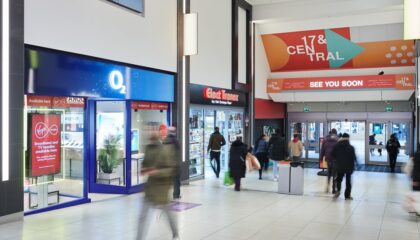As the retail landscape evolves, property managers are encountering new challenges and opportunities in adapting to the expanding nighttime economy within shopping centres. In this first instalment of a three-part series, Nick Hilton, Partner at Workman, explores the impact of this shift on both communities and occupiers, as reported by Retail Destination.
As shopping centres increasingly become vibrant round-the-clock destinations that serve the needs of diverse consumer groups, property managers must grasp how to prioritise safety, community engagement, and operational efficiency.
What’s required is a 24-hour approach to property management that addresses both commercial viability and community needs. With careful management, thoughtful design, and a commitment to community, the challenges of nighttime economy can be transformed into opportunities for vibrant, dynamic urban living.
In the heart of Manchester, Workman-managed Great Northern presents a complex example of urban mixed-use development, where a vibrant nighttime economy thrives alongside residential living. With 90% of its businesses operating evening hours, the scheme has mastered the delicate art of managing diverse commercial activities while maintaining community harmony.
The site boasts approximately 20 businesses with nighttime operations, ranging from bars and restaurants to a multiplex cinema and a casino that opens 24-hour hours for five days a week.
Mark Schofield, Centre Director, emphasises his philosophy for community and commercial accord: “Our responsibility doesn’t end when one of our guests leaves a nighttime venue. It ends when they are safely on their journey home.”
Security staff are carefully selected to embody this community-focused approach. They must demonstrate excellent communication skills and the ability to interact effectively with residents and visitors. “It isn’t just a simple job of walking around, checking doors,” Schofield emphasises. “It’s more about visibility and interaction with people in and around the site.”
Close collaboration with local authorities ensures responsible operation, while Greater Manchester Police maintain a visible presence during peak nights such as New Year’s Eve, creating an additional layer of public safety.
Proactive community relations management
This approach is crucial given Great Northern’s unique geographical context. Surrounded by residential towers and traditional housing, the development must carefully navigate potential noise and disturbance challenges. Schofield’s approach to community relations is proactive and comprehensive. Regular email newsletters keep local residents informed, and the management team quickly addresses any concerns, arranging local visits where necessary.
Remarkably, noise complaints are rare – with Schofield noting he might receive only one complaint every six to seven months. This is partly due to the team’s proactive approach to noise management, with decibel meters used to monitor noise levels and ensure they remain under 70 decibels, creating a quantifiable approach to managing potential disruptions.
The Great Northern ethos goes above and beyond, actively creating community spaces. The Trilogy Real Estate and Peterson Group-owned scheme donates temporarily void units to local initiatives, and has set up a permanent library, early years play centre, and a village hall-type space, used by various community groups. This strategy transforms Great Northern from simply a commercial space to a living, breathing community hub.
Looking ahead, Great Northern is earmarked for significant transformation. The development will introduce 200,000sq. ft of Grade A office space and 749 new apartments, further embedding the site’s community-centric approach. “You can live work, and play here,” says Schofield.
By prioritising community integration, managing nighttime economy responsibly, and creating flexible, multi-purpose spaces, the scheme represents a template for urban development, offering valuable insights for urban planners and property managers.
“Dynamic, integrated urban experience”
Meanwhile, in Solihull, Workman-managed prime retail and leisure destination Touchwood, owned by The Ardent Companies, is pioneering a transformative approach to retail and hospitality, challenging traditional shopping centre models by embracing a vibrant nighttime economy. As General Manager Tony Elvin explains, this isn’t just about shopping, it’s about creating a “dynamic, integrated urban experience.”
Touchwood has pursued a strategic approach that recognises modern consumers want more than just retail. With venues like the Slug & Lettuce – described as “the busiest pub in Solihull” – the area becomes a bustling nighttime destination. Crucially, this hasn’t come at the expense of local residents’ peace. “We’ve never had any issue with the public about bad behaviour from guests leaving our occupiers,” Elvin explains. Harmony is achieved through proactive management, including a town centre managers’ WhatsApp that allows venues to communicate quickly about potential troublemakers – as well as collaborative relationships with local police.
An upcoming gymnastics academy underlines the strategy of providing diverse, family-friendly experiences, and the centre’s approach extends beyond its walls. Elvin is actively involved in local business networks, serving as vice-chair of the Solihull BID and chair of the Visit Solihull steering group. This broader engagement reflects a holistic view of urban development.
Looking forward, Touchwood continues to thrive, with every store either trading, undergoing fit-out out, or under offer. The upcoming gymnastics academy, and ongoing relationships with innovative games venues like Spinners, demonstrate a commitment to creating a dynamic, multi-purpose destination, giving people abundant reasons to visit Touchwood. It’s a philosophy that transforms the shopping centre from a transactional retail space into a vibrant hub that gives back to the community.
A welcoming environment, no matter the hour
At The Aylesham in Peckham, a nightclub means later operating hours, almost taking the centre to 24-hour operation. The onsite team at the Workman-managed scheme focuses on safely funnel customers out along well-lit pathways towards train stations or buses, and not into the less-controlled areas. Adjustments have been made to security, signage, and the overall ambiance, to create a welcoming yet controlled environment. Logistics around managing foot traffic during the nighttime hours are crucial, as is clear CCTV, signage, and controlled access to public areas.
There is also the complexity of the Aylesbury’s redevelopment plans. The proposed mixed-use scheme has historically faced significant community resistance due to concerns over gentrification and affordable housing, but through extensive community outreach, both the nightclub and the redevelopment plans are gaining support.
As retail continues to face challenges from online shopping and changing consumer behaviours, Great Northern, Touchwood and The Aylesbury offer compelling models of adaptation. By prioritising experience, community, and flexibility, it shows how shopping centres can derive commercial success from the nighttime economy, by creating harmonious environments where businesses, residents, and community initiatives co-exist, no matter the hour.

Nick Hilton, Partner at Workman
A version of this article first appeared in Retail Destination.
Find out more: Retail & Leisure Property Management




